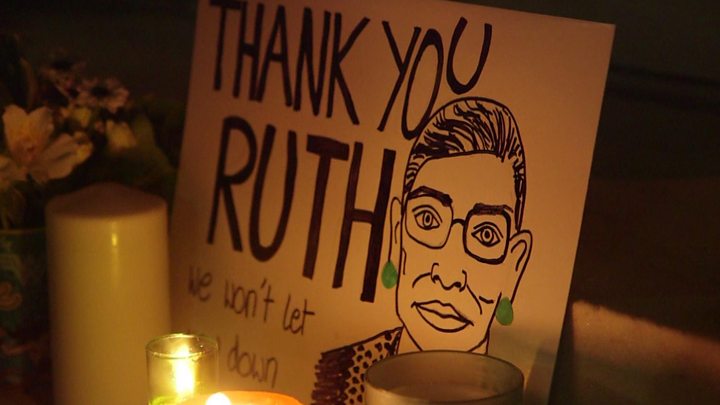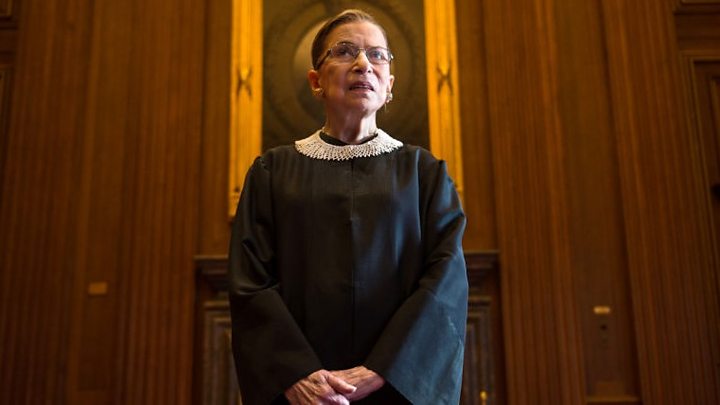World
Ginsburg Supreme Court: Trump to name nominee by week’s end
 Hundreds of people visited the US Supreme Court to pay their respects to the late justice Ruth Bader Ginsburg
Hundreds of people visited the US Supreme Court to pay their respects to the late justice Ruth Bader Ginsburg
President Trump has said he will name a replacement to Ruth Bader Ginsburg by week’s end and urged the Republican-controlled Senate to confirm his Supreme Court choice before 3 November.
The plan has launched a high-stakes battle with far-reaching political consequences ahead of the election.
Mr Trump would replace Ginsburg, a liberal stalwart who died on Friday aged 87, with a conservative.
Approval would cement a right-leaning majority on the court for decades.
The appointment of judges to the Supreme Court is a political decision in which the president chooses who is put forward. The Senate then votes to confirm – or reject – that choice.
- Ruth Bader Ginsburg’s death sparks political firestorm
- Why is the US top court so important?
The ideological balance of the nine-member court is crucial to its rulings on the most important issues in US law.
What happens next?
Table of Contents
On Monday, the president signalled he would nominate a replacement on “Friday or Saturday”, after memorial services for Ginsburg.
“The bottom line is we won the election, we have an obligation to do what’s right and act as quickly as possible,” Mr Trump told Fox News.
Once the president names a nominee, the Senate votes on whether to confirm them. The Judiciary Committee will review the pick first, and then vote to send the nominee to the floor for a full vote.
- How has Trump’s Supreme Court changed America?
- Meet the Supremes – the judges on the top US court
Republicans hold a slim 53-47 majority in the upper chamber. Senate majority leader Mitch McConnell has vowed to hold a confirmation vote before the election in November.
The declaration has sparked furore from Democrats, who have accused Mr McConnell and the Republicans of hypocrisy.
Following the death of conservative justice Anthony Scalia in 2016, Mr McConnell refused to hold a vote to confirm a nominee put forward by then-President Barack Obama, a Democrat.
Mr Obama had nominated Merrick Garland in February of that year – months before the election – but Mr McConnell argued that Supreme Court justices should not be approved in an election year.
In 2017, Mr McConnell also changed Senate rules to allow for a simple majority (51 votes) to confirm nominees.
However, this time around, with a president of the same party, the senate leader says because the Senate and White House are both Republican-held, unlike 2016, the nomination should proceed.
How long does it take to confirm a Supreme Court judge?
Typically, it’s a months long process to go from selection to confirmation – but there are no rules regarding this time frame.
Since 1975, it has taken about 70 days on average. This time, the election is just weeks away.
The last time lawmakers completed a confirmation this speedily was for Ginsburg’s own selection in 1993. She was approved in 42 days.
- Obituary: Ruth Bader Ginsburg
- The top contenders to fill RBG vacancy
To figure out how things might go this year, there are some key senators to watch: two Republicans, Susan Collins and Lisa Murkowski, have backed a delay in the vote.
Maine’s Ms Collins said she had “no objection” to the process of reviewing a candidate beginning now, but that she did not believe the Senate should vote on the candidate prior to November’s election. Ms Collins is facing a tough re-election bid this year.
Alaska Senator Ms Murkowski said she “did not support taking up a nomination eight months before the 2016 election” and believed the “same standard must apply” now.
If the nominee is not confirmed by 20 January, Inauguration Day, they would have to be re-nominated by the president (whoever that ends up being).
What’s at stake?
The highest court in the US is often the final word on highly contentious laws, disputes between states and the federal government, and final appeals to stay executions.
In recent years, the court has expanded gay marriage to all 50 states, allowed for President Trump’s travel ban to be put in place, and delayed a US plan to cut carbon emissions while appeals went forward.
The court also handles reproductive rights issues like abortion – a highly contentious election issue, especially for one of Mr Trump’s key Republican constituencies. Opponents of abortion have called for overturning abortion protections, and appointing judges who sympathise with this view is one of Mr Trump’s pitches for re-election.
 Media captionRuth Bader Ginsburg’s granddaughter says the jurist did not want to be replaced under President Trump
Media captionRuth Bader Ginsburg’s granddaughter says the jurist did not want to be replaced under President Trump
Judge Amy Coney Barrett, a lower court justice seen as a top contender for the Supreme Court nomination, is anti-abortion and has ruled against abortion rights before.
Clara Spera, Ginsburg’s grand-daughter, disclosed that the late justice’s dying wish was not to be replaced until after the election. “She was concerned about this country and about the court that she served so diligently for over 27 years,” Ms Spera told BBC World Service.
“I think that she would be heartened to know that there are many, many people who believe that we need to return to order and norms, and agree and want to fulfil that most fervent wish of hers,” she said.
Ginsburg will lie in state at the US Capitol on Friday.
What’s the reaction?
On Sunday, Democratic presidential candidate Joe Biden said Mr Trump had “made clear this is about power, pure and simple”.
“The United States Constitution allows Americans the chance to be heard – and their voice should be heard… they should make it clear, they will not stand for this abuse of power,” he said.
But Republican Senator Ted Cruz, speaking to ABC News on Sunday, contended that a new justice ought to be confirmed before the election – a reversal of his view back in 2016.
He argued that the American people elected Mr Trump largely to support conservatives on the court. “The president was elected to do this and the Senate was elected to confirm this nomination.”
During a vigil for Ginsburg that night, Democratic Senator Elizabeth Warren drew cheers from the crowd for criticising Republicans over the nomination.
“Mitch McConnell and his henchmen believe that they can ram through a Supreme Court justice only 45 days from Election Day,” she said. “What Mitch McConnell does not understand is that this fight has just begun.”
Who are seen as top contenders?
- Barbara Lagoa: A Cuban American of the Atlanta-based 11th Circuit Court of Appeals, she was the first Hispanic judge on the Florida Supreme Court. She is a former federal prosecutor
- Amy Coney Barrett: Member of the Chicago-based 7th Circuit Court of Appeals, she is a favourite of religious conservatives and known for her anti-abortion views. She was a legal scholar at Notre Dame Law School in Indiana
- Kate Comerford Todd: Deputy White House Counsel, has a lot of support inside the White House. Served as former senior VP and Chief Counsel, US Chamber Litigation Center
